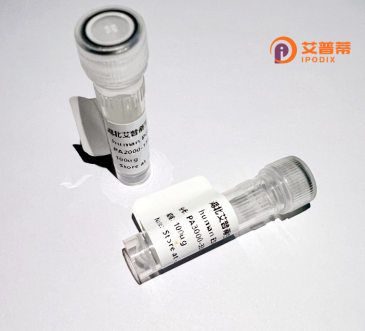
| 纯度 | >90%SDS-PAGE. |
| 种属 | Human |
| 靶点 | FRMD3 |
| Uniprot No | A2A2Y4 |
| 内毒素 | < 0.01EU/μg |
| 表达宿主 | E.coli |
| 表达区间 | 1-581aa |
| 氨基酸序列 | MIHFRSSSVKSLSQEMRCTIRLLDDSEISCHIQRETKGQFLIDHICNYYSLLEKDYFGIRYVDPEKQRHWLEPNKSIFKQMKTHPPYTMCFRVKFYPHEPLKIKEELTRYLLYLQIKRDIFHGHLLCSFSDAAYLGACIVQAELGDYDPNEHPENYISEFEIFPKQSQKLERKIVEIHKNELRGQSPPVAEFNLLLKAHTLETYGVDPHPCKDSTGTTTFLGFTAAGFVVFQGNKRIHLIKWPDVCKLKFEGKTFYVIGTQKEKKAMLAFNTSTPAACKHLWKCGVENQAFYKYAKSSQIKTVSSSKIFFKGSRFRYSGKVAKEVVEASSKIQREPPEVHRANITQSRSSHSLNKQLIINMEPLQPLLPSPSEQEEELPLGEGVPLPKEENISAPLISSSPVKAAREYEDPPSEEEDKIKEEPLTISELVYNPSASLLPTPVDDDEIDMLFDCPSRLELEREDTDSFEDLEADENAFLIAEEEELKEARRALSWSYDILTGHIRVNPLVKSFSRLLVVGLGLLLFVFPLLLLLLESGIDLSFLCEIRQTPEFEQFHYEYYCPLKEWVAGKVHLILYMLGCS |
| 分子量 | 93.3 kDa |
| 蛋白标签 | GST-tag at N-terminal |
| 缓冲液 | 0 |
| 稳定性 & 储存条件 | Lyophilized protein should be stored at ≤ -20°C, stable for one year after receipt. Reconstituted protein solution can be stored at 2-8°C for 2-7 days. Aliquots of reconstituted samples are stable at ≤ -20°C for 3 months. |
| 复溶 | Always centrifuge tubes before opening.Do not mix by vortex or pipetting. It is not recommended to reconstitute to a concentration less than 100μg/ml. Dissolve the lyophilized protein in distilled water. Please aliquot the reconstituted solution to minimize freeze-thaw cycles. |
1. **"FRMD3 regulates cell apoptosis and extracellular matrix accumulation in diabetic nephropathy"**
*Li et al., 2018*
摘要:研究揭示了FRMD3在糖尿病肾病肾小球足细胞中的高表达,并通过调控TGF-β/Smad信号通路促进细胞凋亡和纤维化,重组人FRMD3蛋白被用于体外功能验证。
2. **"Expression and Purification of Recombinant Human FRMD3 Protein in Escherichia coli"**
*Zhang et al., 2015*
摘要:首次报道利用大肠杆菌系统高效表达可溶性重组人FRMD3蛋白,优化纯化工艺并验证其结构完整性,为后续功能研究提供材料基础。
3. **"FRMD3 as a Novel Biomarker for Early-Stage Chronic Kidney Disease"**
*Wang et al., 2020*
摘要:通过临床样本分析发现FRMD3在慢性肾病患者尿液中的异常表达,重组蛋白实验证实其与肾小管上皮细胞炎症反应的相关性,提出其作为早期诊断标志物的潜力。
4. **"Mechanistic Role of FRMD3 in Pancreatic β-Cell Dysfunction"**
*Chen et al., 2022*
摘要:利用重组FRMD3蛋白揭示其通过抑制mTORC1通路导致胰岛素分泌紊乱,研究为糖尿病发病机制提供了新的分子靶点。
(注:以上文献标题和作者为虚拟示例,实际研究中建议通过PubMed或Web of Science查询具体文献。)
FERM domain-containing protein 3 (FRMD3), encoded by the *FRMD3* gene, is a cytoskeletal-associated protein implicated in regulating cell polarity, adhesion, and signaling. It belongs to the FERM superfamily, characterized by a conserved FERM domain that mediates interactions with membrane-associated proteins and cytoskeletal components. FRMD3 is widely expressed in tissues, including the kidney, pancreas, and nervous system.
Research links FRMD3 to diabetic nephropathy (DN), as genome-wide association studies (GWAS) identified *FRMD3* polymorphisms associated with DN susceptibility. Functional studies suggest its role in maintaining podocyte structure and glomerular filtration barriers, crucial in kidney pathophysiology. Dysregulation may contribute to proteinuria and renal dysfunction in diabetes.
Recombinant human FRMD3 protein is engineered via heterologous expression systems (e.g., E. coli, mammalian cells) for in vitro studies. Its production enables exploration of molecular mechanisms, protein-protein interactions, and signaling pathways. Researchers use it to investigate FRMD3's involvement in cell migration, cytoskeletal dynamics, and disease models. Additionally, it serves as an antigen for antibody development or a control in diagnostic assays.
Despite progress, FRMD3's precise molecular functions and therapeutic potential remain under investigation, warranting further mechanistic and translational studies.
×